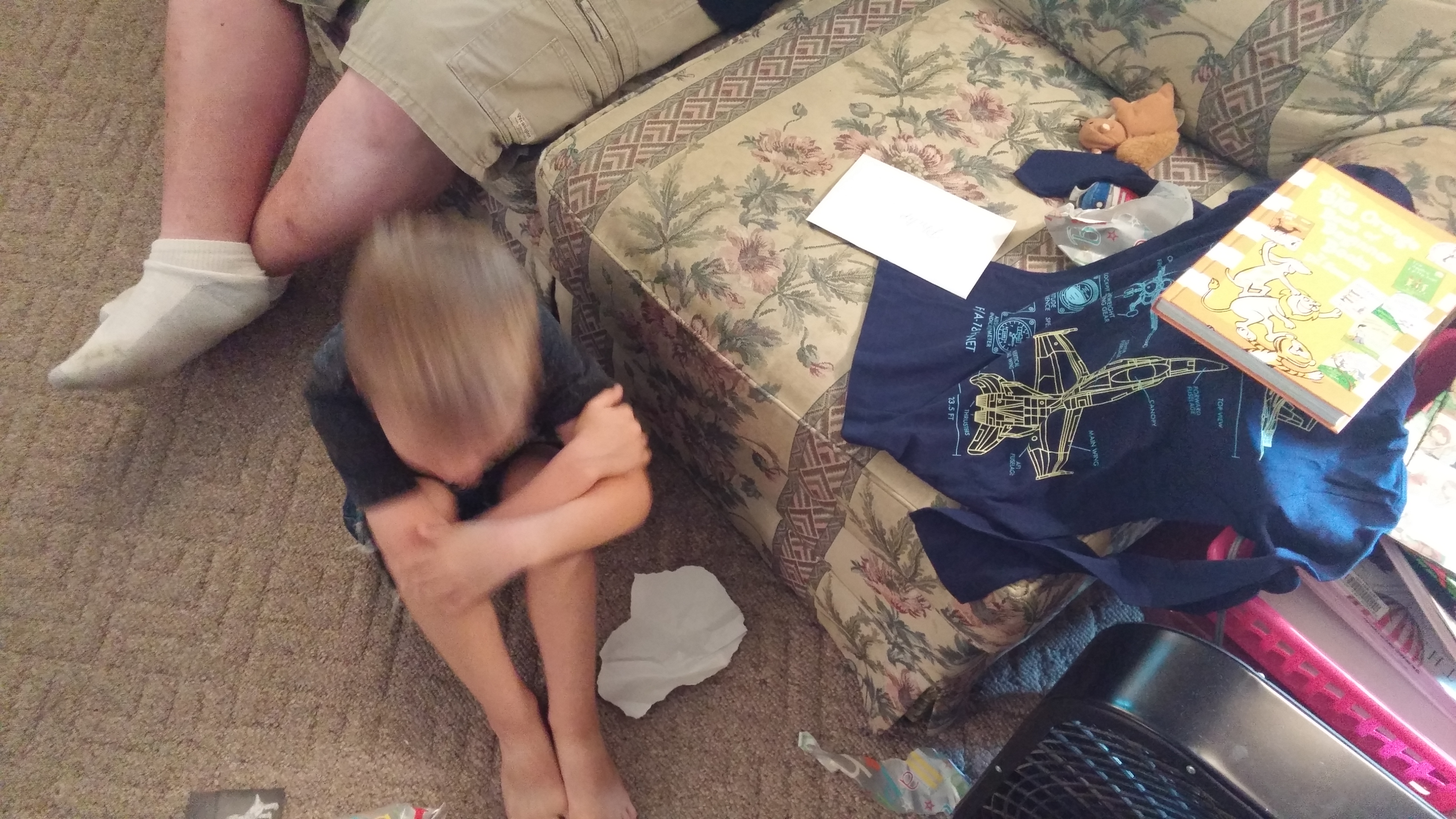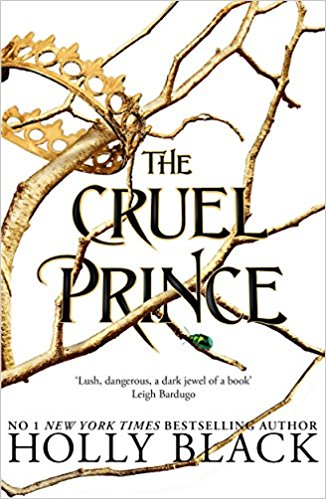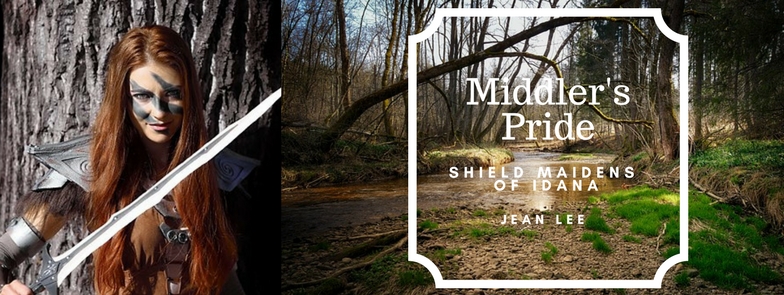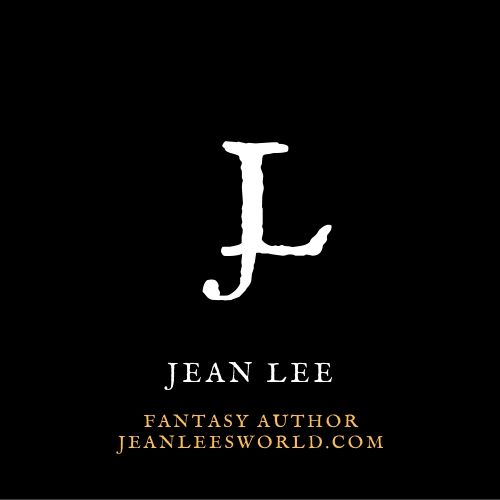Nobody cries crocodile tears quite like Bash.
“This is a SAD BIRTHDAY!” he wails, complete with a “WAAAaaaaAAAAaaaa” that could drown out a fire truck. My mother holds him, soothes him, to no avail.
Why the tears? Because “There are NO TOYS ARE PRESENTS! I WANT A TOY!”
Meanwhile, Biff sits content with his new collection of Disney Cars stories, and Blondie–who already shed her tears over the fact that today isn’t her birthday–eyes the cupcakes, knowing she at least gets sugar and a race car ring out of the deal.
Despite having received toys at the party hosted by in-laws less than 48 hours ago, Bash continues sobbing until bedtime. “This was a SAD BIRTHDAY,” he declares again, thoroughly traumatized.

Annoyed as I am, I can’t bring myself to scold him for his meltdown. Our basement flooded two weeks before his and Biff’s 6th birthday, sending the house into chaos. Everything is everywhere. Stuff’s crammed into the garage, piled in the living room. There’s a mattress and box spring tipped on their sides in the hallway. Decorations are somewhere in the labyrinth of tubs frantically filled as water seeped up through the seams of the house’s foundation. We’re all stepping on each other’s toys, books, and nerves.
It’s lousy.
But is it traumatic?
Sure, if you spin it right. Horror fiction’s got a knack for taking anything–like a ruined birthday party–and turning it into motivation for a killing spree.
But if you’re not out to birth a slasher, then what qualifies as “traumatic”?
TRAUMA : a very difficult or unpleasant experience that causes someone to have mental or emotional problems usually for a long time. medical : a serious injury to a person’s body. —Merriam-Webster Learner’s Dictionary
But sometimes that drive comes from what lies behind in the histories of the characters, and what lies behind them is often traumatic.
The most popular “trauma” I find in storytelling is personal loss. Take comic books, for instance. How many become superheroes because they lost a loved one? Batman–parents. Spider-Man–uncle. Green Arrow–parents. Punisher–family. Nightwing–parents. Flash–mother. Captain Marvel–parents. Daredevil–father. The list goes on for a looooooong time.
Now I’m not saying that personal loss isn’t traumatizing. I should know: I’ve watched grandparents waste away. I drove to the hospital thinking my father ill only to be told at the door he’d died of heart failure. Everyone else already knew, but didn’t want to say anything until after I’d arrived.
Loss fucking sucks, and you’re damn right it changes you.
But there is something cliche about a backstory of personal loss driving one to heroics. Must a character always become a warrior for justice when his parents are shot in a dark alley?

No. Take Jude in Holly Black’s The Cruel Prince. A Fae general comes into her house, kills their parents before her eyes, then takes her and her sisters back to the land of the Fae to raise them as his own. Is Jude driven to heroics?
She kills at least two people and readies herself to kill more out of loyalty to her new Fae court. She’s got the drive and calculating mind of her “new” Fae father.
Not sure what Bruce Wayne would make of that.
Trauma doesn’t require death, either. Consider Starlight from the comic book series The Boys. Of all the young superheroes, it is she who’s given the chance to leave her ultra-conservative group Young Americans and join the Seven, the most powerful group of heroes on the planet. She gets there, thrilled to take the last test and make a difference…
…only to discover the test is having oral sex with Homelander and two other members.
Do they force her? Use their own superpowers to render her helpless?
No.
Starlight consents.
And for the rest of the series she has to struggle with that decision and all its consequences.
Trauma’s not just about losing a piece from our lives, but a piece of ourselves. I know this first-hand. When your body becomes someone else’s thing, you don’t want it. You don’t want to take care of it. You want it to remain separate, the real you buried in the bile churning at the bottom of your gut. You separate your soul from your body because if you don’t, then your soul’s as worthless as your body, as much a nothing to be spat upon and left in the alley. That separation means survival.
But survival and living with oneself are two very, very different things. Trauma, from my experience, does not inspire love.
More like the opposite.
We survive. And we hate that we survive.
Athanasius, one of the little boys in my first short story “The Boy Who Carried a Forest in His Pocket,” was so desperate to flee his “survival” of an abusive home that he happily left with the first stranger he met. Fallen Princeborn: Stolen opens with Charlotte running away from an abusive home. We learn in the opening pages that she’s a fighter, so much so she’d rather punch out your teeth than listen to you talk.

That drive to violence–to hurt others before they can hurt us–that’s what trauma teaches us. This can easily drive a character to do terrible things to those around her. But it is also this drive that can be nurtured to make one want to defend others before they get hurt. It all depends on the character’s environment when the seed of trauma is planted.
Again, there doesn’t need to be some dark, extraordinary experience for a “traumatic event” with long-lasting impact. In my serialized novel Middler’s Pride, Meredydd recalls a moment in childhood when an evil sorcerer attempted to curse her family’s land, but was thwarted when child Meredydd interrupted the spell. Sounds pretty traumatic, running into an evil sorcerer. Yet Mer’s driven, obstinate attitude was the same before and after this event. Apart from shaking hands, her body’s the same before and after this event. So what drives her onward into the story’s narrative?

A childhood without affection. No one abused her, killed a loved one in front of her. Heck, the girl never even broke a bone, or went a day without a full belly. But year after year of watching her step-siblings receive love and attention while she must catch scraps of love from others outside her family…that can hurt far more than any magic curse.
So consider carefully, writers, whether or not your character truly needs trauma in her past for present-day motivation. Death can make its mark, but sometimes the mark need only be a scar, a touch, a moment of undulated terror. Or perhaps it need only be the gathering of little things, subtle as water beneath the ground to eventually flood over your character, altering her nature for the better.
Or worse.
Read on, share on, and write on, my friends!




I feel for him!
Also, love the reflection on trauma as a motivator.
Sent from my iPad
>
LikeLiked by 1 person
Thanks! Yeah, I felt for him. It didn’t help we parents had lousy timing, and gave our toy presents with the in-laws who ALWAYS give toys, and our book presents with my mom who prefers giving “sensible” presents. 🙂 (Though side note: she gave the boys shirts–Bash a jet shirt, and Biff a Pluto shirt, which is awesome, because now scientists are saying Pluto can be a planet again instead of a dwarf planet! Because science 🙂 !)
LikeLike
What? My college astronomy professor will not be happy.
LikeLiked by 1 person
It was just on the news yesterday! Who knows, maybe aaaaall dwarf planets will suddenly be planets now.
Science! 🙂
LikeLike
Jean…you will scar this child for life … Only joking . Happy B/day to him. xxx
LikeLiked by 1 person
LOL I know. Honestly, I was worried because they started Kindergarten the next day. I used his own birthday money as a bribe for good behavior: “If you have a thumbs up day at Kindergarten, then we’ll go to a store and you can pick out a toy to buy with your birthday money.” It worked! 🙂
LikeLiked by 3 people
He will probably like that better. Truly. xxxxxxxxxxxx
LikeLiked by 1 person
A wonderful article, Jean. I love the point you make here. You’re right, of course. And the interesting thing is that what one person will find overwhelming, will be no more than a bump in the road for someone else. Though of course, bereavement and loss of home is always devastating. I hadn’t realised the storyline of The Boys… what a disturbing storyline. I’d love to think that she ends up flinging Homelander off a high building.
Shame – poor little fellow:). It is a question of expectation, isn’t it? I hope his memory of this birthday isn’t that it’s a SAD birthday, after all…
LikeLiked by 1 person
Oddly enough, Bo’s brother pulled a similar tantrum as a child one Christmas. The story is now legend among my in-laws. So I’m going to blame my husband’s bloodline for this one. 🙂
And The Boys is FULL of such backstories. Gosh, I could write a novel on the power of this series. Like I said on my last post on The Boys, it is NOT easy reading, but that’s because this narrative pulls no punches about the depravity to which human–and superhuman–nature can either sink or rise. Starlight’s an integral part of it, especially when she becomes romantically involved with one of The Boys…
LikeLiked by 1 person
Yes… that must make things interesting!
Christmas and Birthdays are emotional times, anyway… I had a sad birthday when both of my adult children forgot mine!
LikeLiked by 1 person
THOSE BUGGERS!
My birthday gets lost in the mix, too. 😦 I’m usually the one that has to remind relatives of other relative birthdays, but I just don’t like saying when MINE is, soooo forgotten it goes. 😦
LikeLiked by 1 person
Oh, I’m not going to be too proud to remind the pair of them next time around:)).
LikeLiked by 1 person
GOOD. Make it extra clear with special Christmas presents you buy for yourself while they receive lumps of stale fruitcake. 🙂
LikeLiked by 1 person
lol:))
LikeLiked by 1 person
I hope Bash has recovered now – and just as importantly, that you have, too. How tricky it is to be a parent and get the job right all of the time, does anyone? I read a quote somewhere about parenthood being the only occupation that most adults have to learn about as they go along (and as every child has individual requirements that challenge seems to me an impossible task).
Story is so much simpler. I do agree with your extrapolation on the impact of scars. I like the subtleties that offers. Once we’ve been told that a character was orphaned, there are a limited number of variants to be explored. Provide a scar, and the potential for dropping suggestive hints about what happened, when and why become limitless: simple additional suspense is added to the mix you already have. Got to be a win: win.
LikeLiked by 1 person
Yes, exactly. Again, loss sucks, but so, so many characters are written in with loss that the loss just loses its impact on readers. Even in my own novel, the death of Charlotte’s dad isn’t the trauma–it’s what happened AFTER the death that’s traumatic. I read somewhere that the current X-Men films have had Magneto lose TWO families now. Okay, death sucks, buuuut for narrative, do you really think yet another family dying is going to have the same impact on audience/character as the first time round? I just can’t think so.
And thanks for Bash. He’s recovered, especially since he had a lovely first day of school and therefore got to go to a store and pick out a new toy to buy with his birthday money. 🙂 Our floors are going to be taken care of at the end of the month (oy, these waiting lists!), so Lord-willing our house will be back to normal before snow falls.
Yes, snow can fall here in October. We’re on borrowed time here….
LikeLiked by 1 person
So, lucky Bash, after all. I am glad he enjoyed his first day at school, and what a great reward. I’ve taken a few nieces & nephews birthday shopping… their excitement and wonder helped me think about shops differently – for an hour or two.
I think you’ve hit the nail on the head with ‘it’s what happened AFTER’. Take this back to fairytale sources, and it’s not the loss of a mother that impacts on most archetypal characters, it’s the installation of a Step-Mother – invariably flawed, if not downright evil, that is the cause of problems. As for the X-Men films, I do seem to have fallen behind. Two dead families? Really? Sounds a little lazy, somehow.
LikeLiked by 1 person
Film-wise, it is. If I recall correctly–it’s been a good many years since I sat and read X-Men regularly–I believe the two different families thing comes from two different threads of comic narrative…a shame, as the threads individually ARE powerful (for instance, he’s a Jew in Nazi Germany and loses his family to the concentration camps, and then there’s another thread where his children are uber superheroes but one dies somehow…and then there’s ANOTHER family in another thread that’s totally normal and gets killed by baddies for some reason). I think there comes a point when screenwriters turn magpie and pluck whatever shiny bit they feel like from various comic universes and toss them into a single narrative to justify later.
And yes, Bash was a happy camper the next day….though the day after that he asked if we could go to a toy store and spend MORE money, to which I said he’d spent all his, and then he graciously offered to spend MY money instead.
Cheeky bugger. 😉
LikeLiked by 1 person
Fantastic article, but ACK! I just see that there’s a new short story and I don’t have time to read it right now?!!! I feel like throwing my own tantrum… 😉
LikeLiked by 1 person
Hold up! You’re fine. It comes out this weekend. 🙂 Hope you like it! xxxxxxxxxxx
LikeLiked by 1 person
Read it, and loved it!!! These glimpses into the world you’ve created are fascinating- had to make time asap! (I’ll admit, when the kids wanted an episode of Rescue Rangers I had that ulterior motive in mind when I said yes :D)
LikeLiked by 1 person
Hee hee! I’ll have to bust out the Duck Tales around here…back when cartoons were cartoons, and the men were men and the women were women… 😉
LikeLiked by 1 person
…and ducks were amazing adventurers! 😀 I love ducktails! I can still sing the entire theme song. And now, I will.
LikeLiked by 1 person
Life is like a hurricane…
LikeLiked by 2 people
It’s a duck blur.
LikeLiked by 2 people
Take on the mystery…or rewrite history! 😀
LikeLiked by 2 people
😀
LikeLiked by 1 person
I loved that theme song so much as a kid I would watch just the intro sometimes!
LikeLiked by 1 person
Isn’t it awesome? 🙂
LikeLiked by 1 person
Oh dear, a sobbing child, flooded floors, first day of school, the thought of winter. September has hit you hard. Good to know ‘normal’ is in the offing.
LikeLiked by 1 person
Oh heavens, yes, please, some normal! Fingers crossed and turning thrice widdershins that our basement can be used once more come October.
LikeLiked by 1 person
Hi Jean. The sentence near the end (“Or perhaps it need only be the gathering of little things, subtle as water beneath the ground to eventually flood over your character, altering her nature for the better.”) is spot-on. It describes many peoples’ lives.
I hope your water situation improves greatly.
Neil
LikeLiked by 1 person
Thank you! Considering life here, it was pretty damn apt. 🙂
And thanks. Praying we’ve got a sense of normalcy here by Halloween…as normal as life can be around here, anyway. 🙂
LikeLiked by 1 person
Poor Bash! Nothing gets me like a crying kid. The world is flooding, basement by basement, city by city. Gonna have to ready those arcs soon.
LikeLiked by 2 people
I know, right? Thanks for reading! x
LikeLiked by 1 person
Just downloaded no more pretty rooms. Looking forward to reading. I loved the first three (and will eventually leave a comment on Amazon, but didn’t want to leave just any old drivel and I’m up to my eyeballs in preparing for a speech I have to give next week). I’m also going to take your review on trauma to heart. I’ve been a bit stuck on my novel and it’s for the very reason you discuss. Trauma comes in all shapes and sizes so perhaps I don’t need to kill someone (in the book, mind) to make it real. :0) So thanks for that. ox
LikeLiked by 1 person
Huzzah! Glad you like the stories–I’m hoping to FINALLY get to those interview questions in the next few days, after I get Book 2 back to the editors (the ending was waaaaaaaaay too sugary). I’m glad my post got you thinking. Just asking Bo about superhero parent deaths made me realize how “death of a loved one” is this sort of backstory crutch. People don’t have to die to create trauma. Trauma can come from anywhere…and really, a person doesn’t NEED trauma to move forward. Jeff Vandermeer’s ANNIHILATION is a brilliant example of this: the biologist is driven by her passion to study and learn. Sure, the trauma of her husband returning only to die might be *part* of her motivation, but I see her drive for truth taking over all.
LikeLiked by 1 person
Is that the movie that just came out on video? I’ve been meaning to watch it.
A couple weeks ago I decided that I didn’t want anyone to die in my novel and just a few days ago think I worked out an alternative. Your post solidified my decision so thanks and yay, you!
Whenever you get to the Qs is fine. We do put impossible deadlines on ourselves, don’t we?❤️
LikeLiked by 1 person
DON’T WATCH THE MOVIE!!!!!!
Ahem.
Seriously, don’t. The alter so, so much, including the protagonist. The biologist goes for a seeker of truth to a woman who committed adultery and feels bad about it.
Oh hooray! Way to trust your gut! 🙂
Good. I should be able to get them done next week…huzzah to that too! 🙂 xxxxxx
LikeLiked by 1 person
Always making the woman out to be the bad guy! I don’t know why Hollywood feels that the normal passions that people have aren’t relevant enough for the big screen. 🙄
LikeLiked by 1 person
Yes, exactly! They dumped these cliche backstories on the female characters. They couldn’t just be strong female characters like they are in Vandermeer’s book. Nope. They have to be “oh, abused, or abandoned, oh, adulteress,” and so on. And yeah, I’ve got my own characters with trauma, but you don’t need it for EVERY girl EVERY time. Jeez!
LikeLiked by 1 person
👍👍👍
LikeLiked by 1 person
I am glad the trauma was skillfully fixed 🙂 I wonder what would happen if one of my granddaughters found out a toy is missing from their birthday present. They know they are getting a toy, a book and a piece of clothing for their birthday, and this knowledge has been passed from the eldest to the younger like an article of faith. The seven years old still expected a stuffed toy this year… We will see if something changes when she is eight 🙂
LikeLiked by 2 people
It’s a culture shock, to be sure! Blondie still usually gets some Lego for the “toy” requirement, so we’re safe…so far. Dunh Dunh DUUUUUNH!
LikeLiked by 1 person
Pingback: #Lessons Learned from #MotherNature: #Inspiration for the #Monsters of #Fiction Hide Under Every Leaf. | Jean Lee's World
Pingback: Lessons Learned from #HollyBlack: #write a #hero with #hopes&dreams for compelling #fiction | Jean Lee's World
Pingback: #lessons Learned from #GarthEnnis, @DarickR, and #TheBoys: not all #heroes want to seek redemption. | Jean Lee's World
Pingback: #AuthorInterview: #Wisconsin #Mystery #Writer Patricia Skalka Shares Setting Inspiration and Tips on Writing a Unique Detective | Jean Lee's World
Pingback: #WritingLife: The Neglected Garden | Jean Lee's World